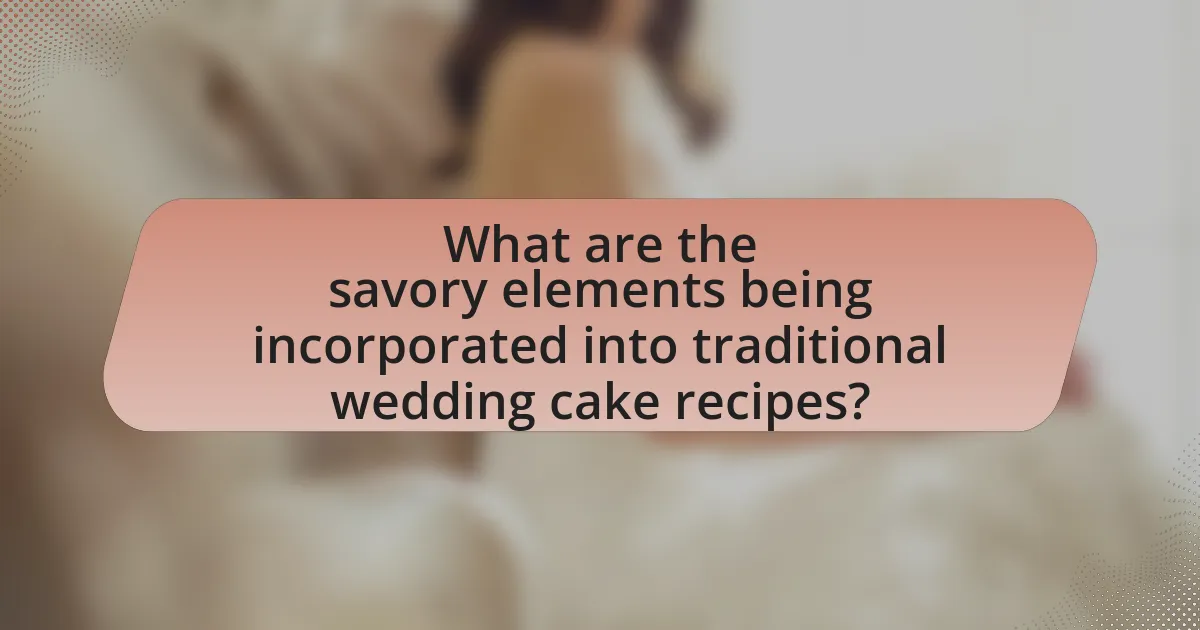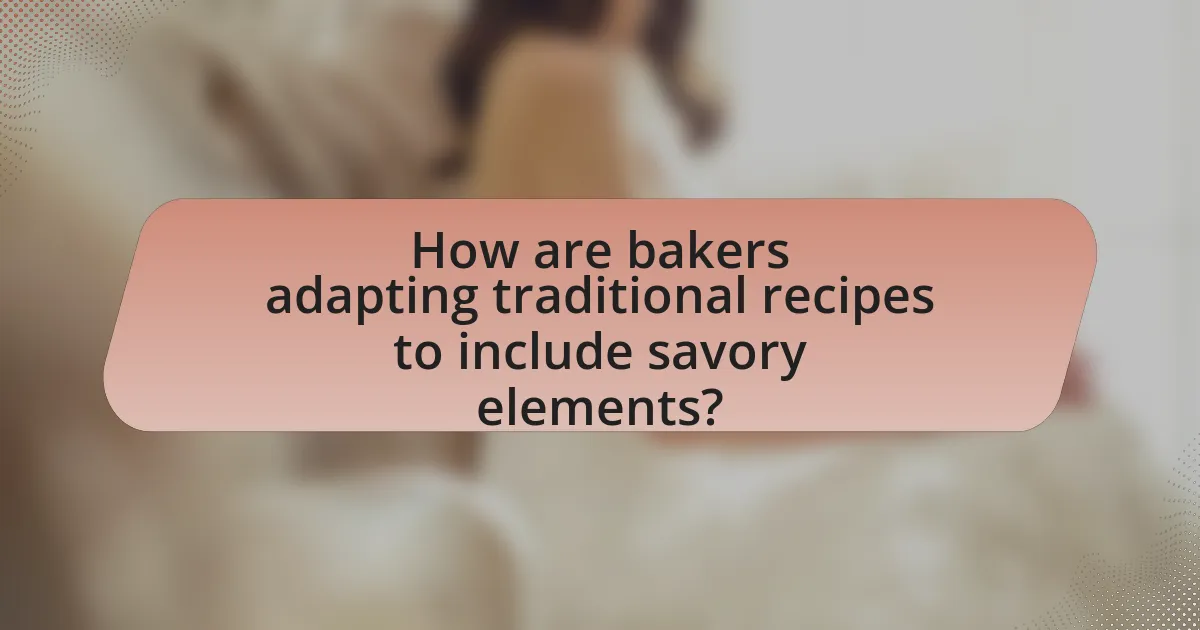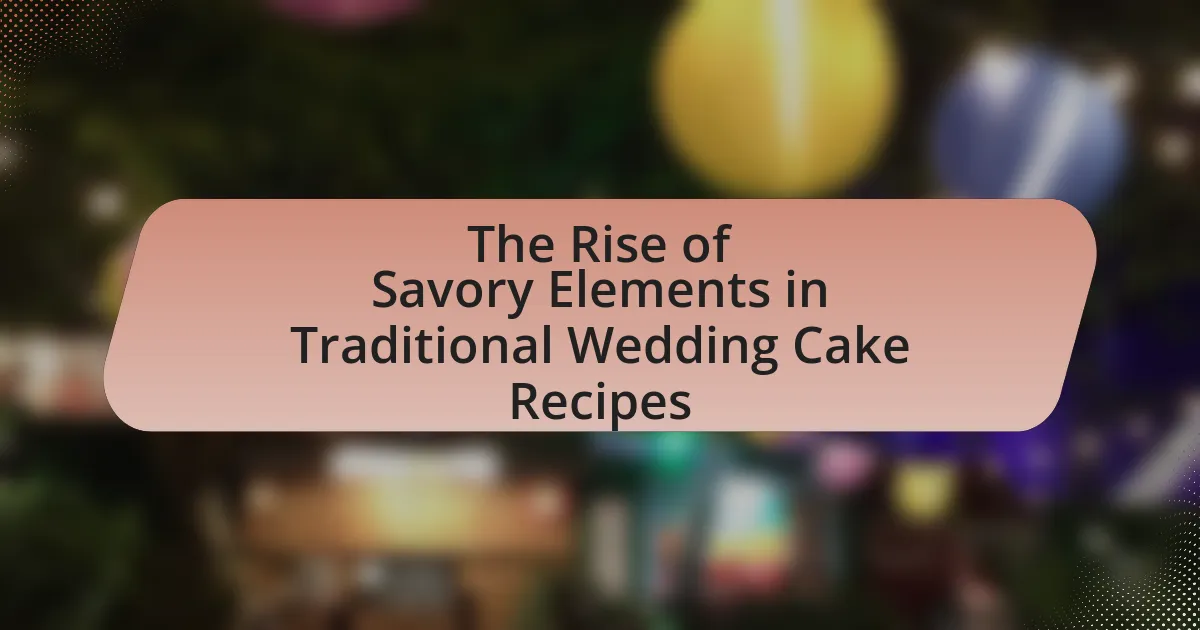The article examines the increasing incorporation of savory elements into traditional wedding cake recipes, highlighting the use of herbs, spices, and cheese to create complex flavor profiles. It discusses how this trend reflects a shift in consumer preferences, with couples seeking unique culinary experiences that move beyond classic sweet cakes. Key savory ingredients gaining popularity include rosemary, thyme, goat cheese, and olive oil, which enhance the overall taste and allow for greater personalization. The article also addresses the challenges bakers face in balancing savory and sweet flavors, as well as the cultural influences shaping this evolving trend in wedding cakes.

What are the savory elements being incorporated into traditional wedding cake recipes?
Savory elements being incorporated into traditional wedding cake recipes include herbs, spices, and cheese. These ingredients enhance flavor profiles, moving away from solely sweet components. For instance, rosemary and thyme are increasingly used to add aromatic depth, while spices like cardamom and black pepper introduce warmth and complexity. Additionally, cheese, particularly cream cheese or ricotta, is being blended into batters or frostings, providing a rich, savory contrast to the sweetness of traditional cakes. This trend reflects a broader culinary movement towards balancing flavors in desserts, appealing to diverse palates and modern tastes.
How have savory flavors changed the landscape of wedding cakes?
Savory flavors have significantly transformed the landscape of wedding cakes by introducing diverse taste profiles that challenge traditional sweet-only options. This shift reflects a growing trend among couples seeking unique culinary experiences, as evidenced by the increasing popularity of flavors such as rosemary, olive oil, and even cheese in wedding cake recipes. According to a survey by The Knot, 25% of couples in 2022 opted for non-traditional flavors, indicating a clear departure from classic vanilla and chocolate. This incorporation of savory elements not only enhances flavor complexity but also allows for greater personalization, catering to varied palates and dietary preferences, thus reshaping the expectations surrounding wedding cakes.
What specific savory ingredients are becoming popular in wedding cakes?
Savory ingredients such as herbs, cheese, and spices are becoming popular in wedding cakes. Specifically, flavors like rosemary, thyme, and basil are being incorporated into cake batters and frostings, while cheeses like goat cheese and mascarpone are used for fillings and icings. The trend reflects a growing interest in unique flavor profiles and a departure from traditional sweet-only cakes, appealing to couples seeking innovative culinary experiences for their celebrations.
How do these savory elements complement traditional sweet flavors?
Savory elements enhance traditional sweet flavors by providing a contrasting taste profile that balances sweetness with umami or saltiness. This combination creates a more complex flavor experience, as seen in the use of ingredients like herbs, spices, or cheese in wedding cakes, which can elevate the overall palate. For example, the incorporation of rosemary or thyme can add depth to a vanilla cake, while a hint of sea salt can intensify the sweetness of chocolate. This interplay between savory and sweet has been increasingly embraced in culinary trends, reflecting a broader shift towards innovative flavor pairings in desserts.
Why are couples opting for savory wedding cakes?
Couples are opting for savory wedding cakes to reflect their personal tastes and culinary preferences. This trend is driven by a desire for unique and memorable dining experiences that go beyond traditional sweet cakes. Savory cakes can incorporate flavors such as cheese, herbs, and vegetables, appealing to guests who appreciate innovative cuisine. Additionally, the rise of food culture and gourmet dining has influenced couples to choose options that showcase creativity and sophistication in their wedding menus.
What trends in wedding planning are influencing this shift?
The trend of incorporating savory elements into traditional wedding cake recipes is influenced by a growing preference for unique and personalized wedding experiences. Couples are increasingly seeking to reflect their individual tastes and cultural backgrounds in their celebrations, leading to the integration of flavors such as herbs, cheeses, and spices into cake designs. This shift is supported by data from wedding industry reports indicating that 30% of couples now prioritize food experiences over traditional cake options, showcasing a significant change in wedding planning priorities.
How do cultural influences play a role in the rise of savory elements?
Cultural influences significantly contribute to the rise of savory elements in traditional wedding cake recipes by integrating local flavors and culinary practices into cake design. For instance, regions with a strong culinary heritage often incorporate ingredients like herbs, spices, and cheeses, reflecting their gastronomic identity. In Italy, for example, savory cakes such as “torta salata” showcase the use of cheese and vegetables, illustrating how cultural traditions shape flavor profiles. Additionally, globalization has led to the fusion of diverse culinary practices, allowing savory elements to gain popularity in wedding cakes across various cultures, as seen in the increasing use of ingredients like olive oil and savory spices in modern recipes. This blending of cultural influences not only enhances the flavor but also creates a unique representation of the couple’s heritage in their wedding celebrations.

How are bakers adapting traditional recipes to include savory elements?
Bakers are adapting traditional recipes by incorporating ingredients such as herbs, cheeses, and spices to create savory elements in their baked goods. This trend reflects a growing consumer interest in unique flavor profiles and culinary innovation, as evidenced by the increasing popularity of savory wedding cakes that feature flavors like rosemary, goat cheese, and even bacon. Research indicates that 30% of couples are opting for non-traditional flavors in their wedding cakes, showcasing a shift towards more adventurous and personalized culinary experiences.
What techniques are bakers using to incorporate savory flavors?
Bakers are using techniques such as infusing dough with herbs, incorporating cheese, and adding savory spices to incorporate savory flavors into their creations. For instance, the use of rosemary or thyme in cake batters enhances the flavor profile, while cheeses like goat cheese or cream cheese can add richness and depth. Additionally, spices such as black pepper or smoked paprika are being integrated into frostings and fillings, creating a unique contrast to traditional sweetness. These methods reflect a growing trend in the culinary world, where savory elements are increasingly embraced in desserts, particularly in wedding cakes, to offer a more complex taste experience.
How do bakers balance savory and sweet in their recipes?
Bakers balance savory and sweet in their recipes by carefully adjusting ingredient ratios and incorporating complementary flavors. For instance, they may use herbs, spices, or cheeses to enhance the savory profile while maintaining sweetness through sugars or fruits. This technique is evident in modern wedding cakes, where flavors like rosemary or goat cheese are paired with traditional sweet elements, creating a harmonious blend that appeals to diverse palates. The successful integration of these contrasting flavors relies on understanding how savory notes can elevate sweetness, as demonstrated in culinary practices that emphasize balance and complexity in flavor profiles.
What are the challenges bakers face when creating savory wedding cakes?
Bakers face several challenges when creating savory wedding cakes, primarily related to flavor balance, texture, and ingredient compatibility. Achieving the right flavor balance is crucial, as savory elements must complement rather than overpower traditional cake flavors. Additionally, the texture of savory cakes can differ significantly from sweet cakes, requiring bakers to experiment with different ingredients to achieve a desirable consistency. Ingredient compatibility poses another challenge, as bakers must ensure that savory components, such as cheeses or herbs, work harmoniously with the cake base and frosting. These challenges necessitate careful recipe development and testing to create a successful savory wedding cake.
What are some examples of successful savory wedding cake recipes?
Successful savory wedding cake recipes include options like a cheese and herb cake, which combines layers of rich cheese with fresh herbs, creating a flavorful alternative to traditional sweet cakes. Another example is a savory vegetable cake, often made with roasted vegetables and spices, providing a hearty and visually appealing centerpiece. Additionally, a meat-based cake, such as a chicken or ham cake, can be crafted using layers of meat and complementary flavors, appealing to guests looking for a unique dining experience. These recipes have gained popularity as couples seek to incorporate personalized and unconventional elements into their wedding celebrations.
How do these recipes differ from traditional wedding cake recipes?
These recipes differ from traditional wedding cake recipes primarily by incorporating savory elements instead of solely sweet flavors. Traditional wedding cakes typically feature layers of sweet sponge or fruitcake, adorned with rich buttercream or fondant, while the newer recipes may include ingredients like herbs, cheeses, or spices, creating a unique flavor profile. For instance, cakes infused with rosemary or topped with goat cheese frosting represent this shift towards savory, contrasting sharply with the conventional sweet cake experience. This evolution reflects changing tastes and a desire for more diverse culinary experiences at weddings.
What feedback have couples provided about these savory cakes?
Couples have provided overwhelmingly positive feedback about savory cakes, often praising their unique flavor profiles and the innovative twist they bring to traditional wedding desserts. Many couples report that the incorporation of savory elements, such as herbs, cheeses, and vegetables, enhances the overall dining experience, making the cake a memorable centerpiece. Additionally, couples appreciate the versatility of savory cakes, as they can be tailored to match personal tastes and wedding themes, leading to a more personalized celebration. This trend reflects a growing desire for culinary creativity in weddings, as evidenced by surveys indicating that over 60% of couples are interested in non-traditional cake options.

What are the potential benefits of choosing savory wedding cakes?
Choosing savory wedding cakes offers unique flavor profiles that can enhance the overall dining experience at a wedding. These cakes can cater to diverse palates, appealing to guests who may prefer savory over sweet options. Additionally, savory cakes can incorporate a variety of ingredients, such as herbs, cheeses, and vegetables, which can provide a more complex taste and texture compared to traditional sweet cakes. This trend aligns with the growing interest in gourmet and artisanal foods, allowing couples to personalize their wedding menu and create memorable culinary experiences.
How can savory wedding cakes enhance the overall wedding experience?
Savory wedding cakes can enhance the overall wedding experience by providing a unique culinary option that caters to diverse tastes and preferences. These cakes often incorporate flavors such as cheese, herbs, and vegetables, which can surprise and delight guests, making the dining experience more memorable. For instance, a savory cake made with layers of cheese and spinach can serve as a conversation starter and create a more inclusive atmosphere for those who may not enjoy traditional sweet cakes. Additionally, the incorporation of savory elements can reflect the couple’s personal tastes and cultural backgrounds, adding a layer of personalization to the celebration. This trend aligns with the growing demand for innovative and non-traditional food options at weddings, as evidenced by a 2021 survey from The Knot, which indicated that 30% of couples opted for unique cake flavors beyond the classic vanilla or chocolate.
What unique flavor profiles do savory cakes offer to guests?
Savory cakes offer guests a diverse range of unique flavor profiles that blend traditional cake elements with savory ingredients. These cakes can incorporate flavors such as cheese, herbs, vegetables, and spices, creating a contrast to the sweetness typically associated with cakes. For example, a rosemary and olive oil cake provides an aromatic and earthy flavor, while a carrot and feta cake combines sweetness with a salty tang. The inclusion of ingredients like sun-dried tomatoes or smoked salmon can also introduce umami notes, enhancing the overall tasting experience. This innovative approach to cake-making reflects a growing trend in culinary arts, where savory elements are increasingly embraced in traditional recipes, appealing to a broader palate and offering guests a memorable dining experience.
How do savory cakes contribute to a memorable wedding theme?
Savory cakes enhance a memorable wedding theme by offering unique flavor profiles that surprise and delight guests. These cakes, often made with ingredients like cheese, herbs, and vegetables, break away from traditional sweet cakes, allowing couples to express their culinary preferences and personal style. For instance, a savory cake can reflect regional cuisine or seasonal ingredients, creating a cohesive theme that resonates with the overall wedding aesthetic. This innovative approach not only captivates guests but also fosters conversation and engagement, making the wedding experience more memorable.
What tips should couples consider when selecting a savory wedding cake?
Couples should consider flavor profiles, dietary restrictions, and presentation when selecting a savory wedding cake. Flavor profiles should complement the overall menu, ensuring that the cake harmonizes with other dishes served at the wedding. Dietary restrictions, such as allergies or preferences for vegetarian or gluten-free options, must be taken into account to accommodate all guests. Presentation is also crucial; a visually appealing cake can enhance the wedding’s aesthetic and create a memorable centerpiece. These considerations are essential as they ensure that the savory wedding cake is not only delicious but also inclusive and visually striking.
How can couples ensure their savory cake aligns with their wedding vision?
Couples can ensure their savory cake aligns with their wedding vision by clearly defining their theme, flavors, and presentation style. Establishing a cohesive theme allows couples to select savory ingredients that complement their overall wedding aesthetic, such as incorporating herbs or cheeses that match the color palette or style of the event. Additionally, couples should communicate their preferences to their baker, providing examples of desired flavors and textures, which can help the baker create a cake that reflects the couple’s unique vision. Research indicates that personalized wedding cakes, including savory options, enhance guest experience and satisfaction, reinforcing the importance of aligning the cake with the couple’s overall wedding concept.
What are common pitfalls to avoid when choosing a savory wedding cake?
Common pitfalls to avoid when choosing a savory wedding cake include neglecting flavor balance, overlooking dietary restrictions, and failing to consider the cake’s texture. Flavor balance is crucial; a cake that is too salty or spicy can overwhelm guests, while a bland cake may not be memorable. Dietary restrictions must be addressed, as many guests may have allergies or preferences that could limit their enjoyment. Additionally, the texture of the cake should complement the savory elements; a dry or overly dense cake can detract from the overall experience. These considerations ensure that the savory wedding cake is both enjoyable and suitable for all guests.
